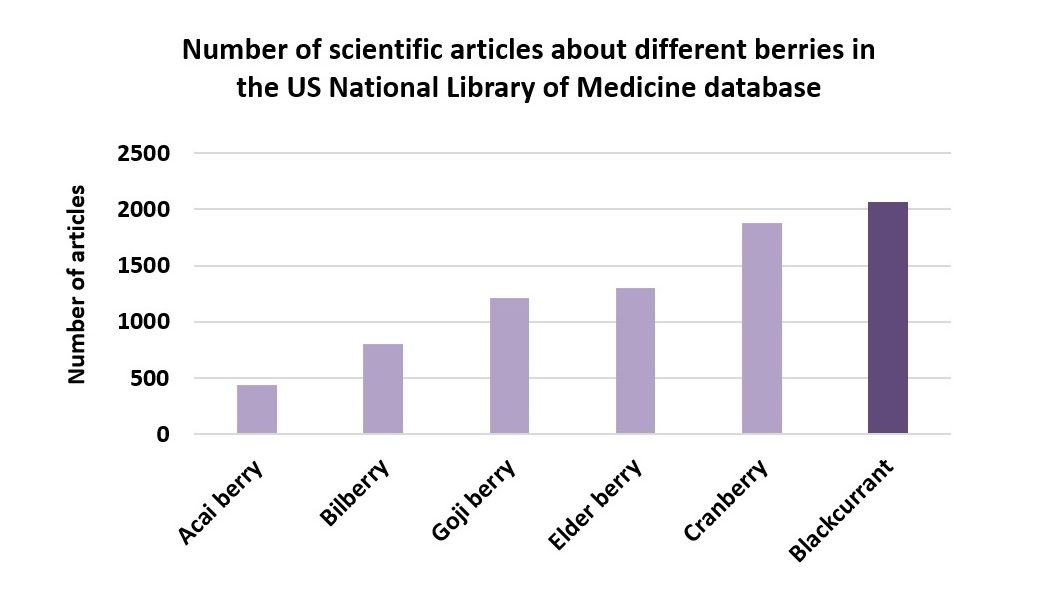Satoko Shimooka
What is so special about the antioxidants in New Zealand Blackcurrants?
In addition to having some of the highest levels of anthocyanin antioxidants of any commonly consumed fruit, the anthocyanins in New Zealand Blackcurrants act in a unique way to give you a more active and healthier body. New Zealand Blackcurrant anthocyanins can act as antioxidants, protecting the body’s cells from the damaging effects of free radicals, but their most important
Polyphenols, flavonoids, anthocyanins – all antioxidants, but are they different?
Our bodies contain a wide range of antioxidants, some manufactured by our bodies, and some only obtained from the food we eat. Polyphenols are one of the most commonly occurring antioxidants in the food we eat, particularly in fruit and vegetables. These are compounds with multiple (poly) phenol groups, chemical ring structures with one or more hydroxyl (OH) groups attached,
What are antioxidants and how do they keep us healthy?
Reactions of biochemicals underly all the functions of our body. How we turn food into energy, the function of our brains and other organs, the movement of our muscles, these all require the reactions of biochemicals inside and outside the cells of our body. A natural consequence of these reactions is the generation of free radicals, highly reactive intermediates of
Living a long and healthy life
Part of the natural process of aging includes changes to our bodies that unfortunately usually results in a decline in function. We find we can no longer do what we did when we were younger. As if this wasn’t bad enough the risk of us suffering from one or more of the diseases associated with aging increases as we grow
Wake up with blackcurrants instead of coffee
Many of us appreciate the boost that first coffee of the day gives us. For some of us topping this up with a second cup after lunch helps get us through to the end of the day. It is the caffeine in coffee that stimulates our brains, increasing alertness and reducing drowsiness. However, caffeine can also cause nervousness, restlessness and
What makes a food super?
When choosing food to include on our shopping list we are often attracted by a claim that a particular item is a “superfood”. It is important to understand that while we are all looking for foods that really are “super”, the term “superfood” is a marketing term and not a scientific term. Marketers generally use this term to describe a
Establishing healthy eating habits
Large population studies looking at diet and health have shown that eating five or more servings of fruit and vegetables every day maintains healthy immune and cognitive function, and reduces the risk of developing illnesses of ageing such as diabetes and heart disease. Detailed dietary analysis has shown that it is the anthocyanin biomolecules in fruit and vegetables that are
Made in New Zealand – with care
Now, more than ever, we are all taking extra care with how we live, particularly with the food we eat. Not only do we want our food to be healthy, but we also want to know where it has come from, and to be assured of its safety and that the utmost care has gone into its growing and preparation.
New Zealand blackcurrant anthocyanins enhance the delivery of nutrients to, and the removal of waste products from muscles during exercise
The ability of our muscles to perform while we exercise is dependent on them receiving, via our blood circulation system, nutrients that our muscles cells need for energy. One of the most important nutrients is oxygen which is involved in the conversion of glucose into energy by our muscles. A clinical trial undertaken at the University of Gloucestershire in England
New Zealand blackcurrant anthocyanins decrease the health-damaging consequences of being overweight
We all struggle with our eating habits and managing our weight, even though we know the importance of choosing the right foods and not overeating. Changes in life’s circumstances particularly tempt us to reach for those foods that comfort us, and often these foods are unfortunately not the healthiest. Consequences of being overweight can include elevated levels of blood











